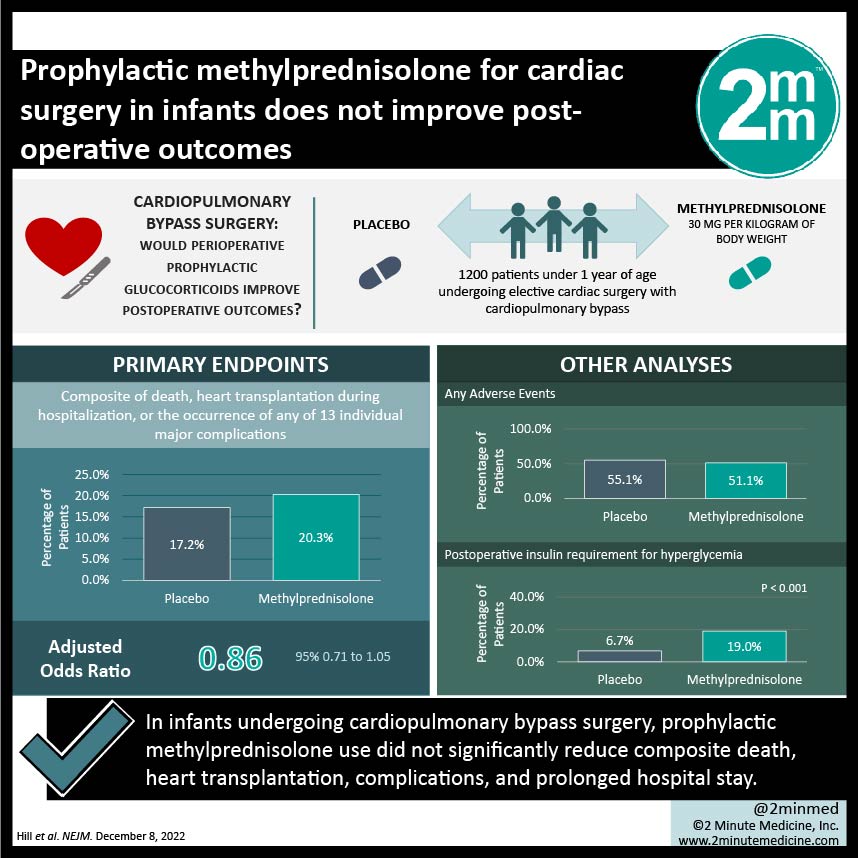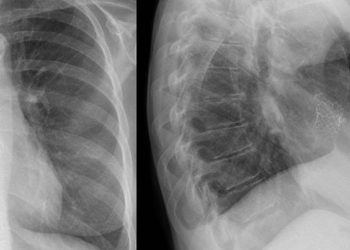#VisualAbstract: Prophylactic methylprednisolone for cardiac surgery in infants does not improve post-operative outcomes
1. In infants undergoing cardiopulmonary bypass surgery, prophylactic methylprednisolone use did not significantly reduce composite death, heart transplantation, complications, and prolonged hospital stay.
2. Prophylactic methylprednisolone use was associated with an increased risk of postoperative hyperglycemia.
Evidence Rating Level: 1 (Excellent)
Study Rundown: Perioperative glucocorticoids have been used for decades to attenuate cardiopulmonary bypass-mediated systemic inflammation, but such use remains controversial. Several meta-analyses have provided conflicting information. Some suggest that mortality is lower with the use of perioperative glucocorticoids, while other meta-analyses showed no difference in mortality. Therefore, there is a gap in knowledge as to understanding the safety and efficacy of perioperative methylprednisolone in infants undergoing surgery for congenital heart disease. Overall, this study found that for infants younger than one year of age undergoing cardiac surgery, prophylactic use of methylprednisolone did not reduce the likelihood of a ranked composite of death, heart transplantation, major complications, and prolonged hospital stay. It was associated with an increased risk of postoperative hyperglycemia. This study was limited as enrolled patients were permitted to receive postoperative glucocorticoids. Additionally, registry data is not as accurate as data collected and placed into a traditional trial database. Nevertheless, these study’s findings are significant, as they demonstrate that prophylactic methylprednisolone for infants undergoing cardiac surgery provides no significant benefit in terms of outcome.
Click to read the study in NEJM
Relevant Reading: Halothane–Morphine Compared with High-Dose Sufentanil for Anesthesia and Postoperative Analgesia in Neonatal Cardiac Surgery
In-Depth [randomized controlled trial]: This double-blind, randomized, placebo-controlled trial involved patients from 24 congenital heart disease centers in the United States. Patients who were undergoing elective cardiac surgery with cardiopulmonary bypass were eligible for inclusion if they were younger than one year of age. Patients who had an adjusted gestational age of fewer than 37 weeks at the time of surgery, had received any glucocorticoids within two days before surgery, had an infection contraindicating glucocorticoid use, or were receiving preoperative mechanical circulatory support were excluded from the study. The primary outcome measured was a composite of death, heart transplantation during hospitalization, or the occurrence of any of 13 individual major complications. Outcomes in the primary analysis were assessed via a proportional odds logistic regression model. Based on the primary analysis, the composite outcome did not differ significantly between the methylprednisolone group and the placebo group (adjusted odds ratio, 0.86; 95% Confidence Interval [CI], 0.71 to 1.05). Secondary analyses showed an odds ratio for the composite outcome of 0.82 (95% CI, 0.67 to 1.00) and a win ratio of 1.15 (95% CI, 1.00 to 1.32) in the methylprednisolone group as compared with the placebo group, findings suggestive of a benefit with methylprednisolone. However, patients in the methylprednisolone group were more likely than those in the placebo group to require postoperative insulin for hyperglycemia (19.0% vs. 6.7%). Overall, this study demonstrates that prophylactic use of methylprednisolone did not significantly reduce the likelihood of a worse outcome and was associated with a higher risk of developing postoperative hyperglycemia warranting insulin.
©2023 2 Minute Medicine, Inc. All rights reserved. No works may be reproduced without expressed written consent from 2 Minute Medicine, Inc. Inquire about licensing here. No article should be construed as medical advice and is not intended as such by the authors or by 2 Minute Medicine, Inc.








